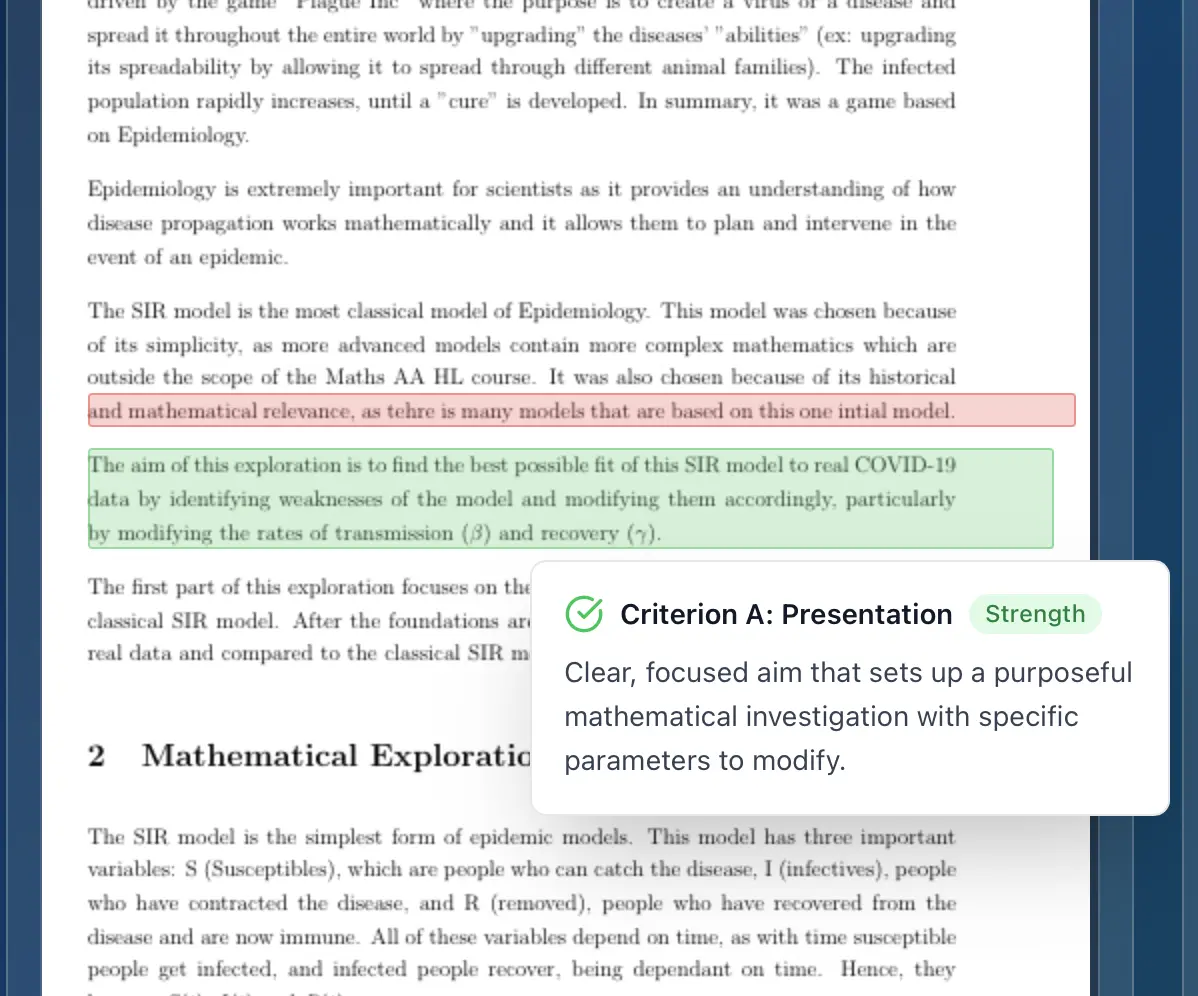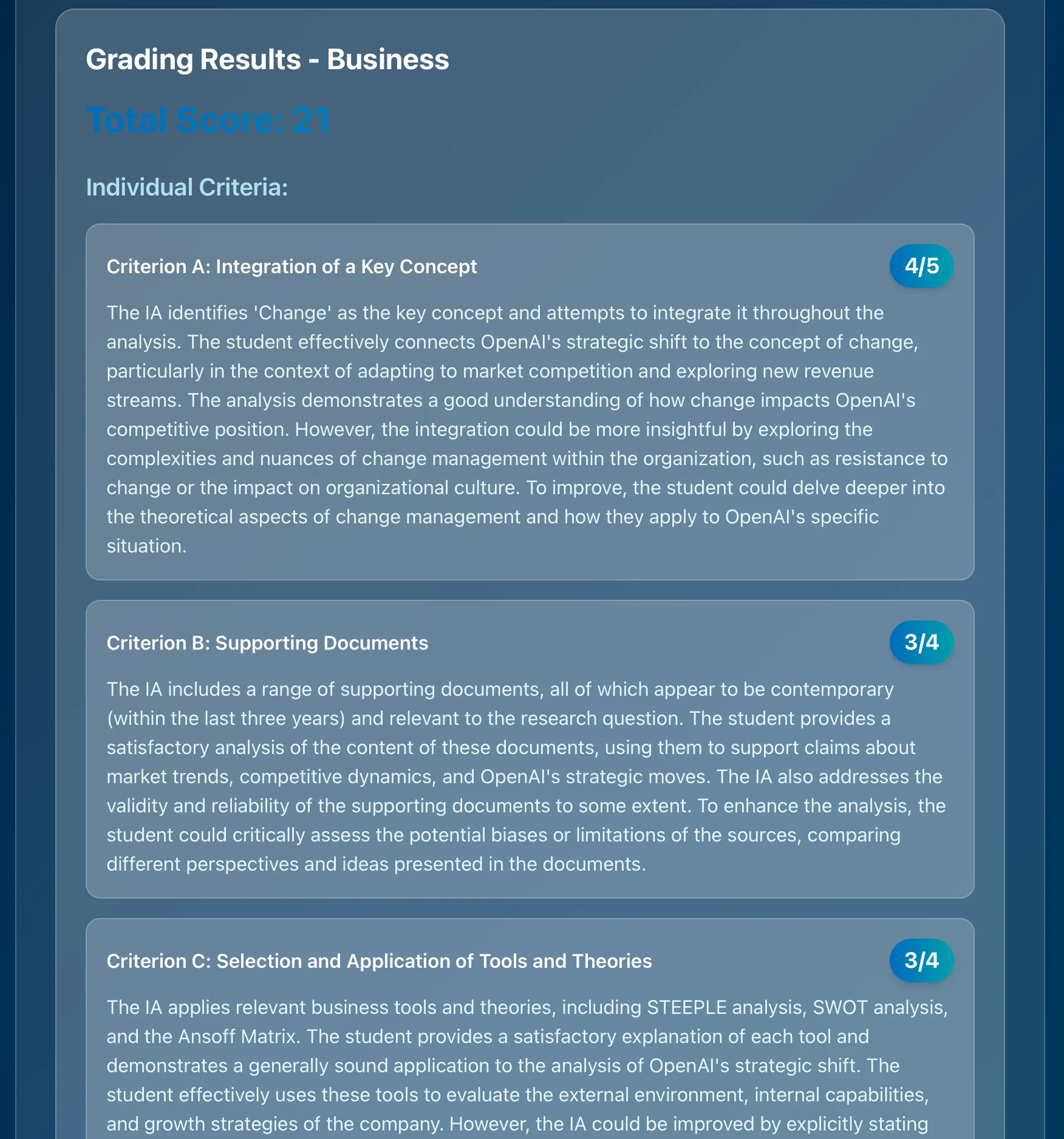Top 10 IB Physics Experiment Ideas for Your Internal Assessment
Are you an IB Physics student searching for the perfect experiment idea for your Internal Assessment (IA)? Finding a suitable topic is crucial for a successful IA, as it sets the foundation for your entire investigation. This blog post offers 10 inspiring IB Physics experiment ideas, complete with tips to help you design a strong investigation, analyze your data effectively, and ultimately, achieve a high score. We'll also explore how AI-powered tools can streamline your assessment process and provide valuable feedback.
Introduction: Choosing the Right Physics IA Experiment
The IB Physics Internal Assessment (IA) is a significant component of your overall IB Physics grade. It's your opportunity to demonstrate your understanding of physics concepts through hands-on experimentation and rigorous analysis. Choosing the right experiment is paramount. A good IA experiment should be manageable within the time constraints, allow for sufficient data collection and analysis, and connect to the IB Physics syllabus. This guide will provide you with ten compelling ideas to kickstart your IA journey and offer insights into maximizing your score. Remember, a well-executed experiment, coupled with a clear and concise report, is key to success.
Struggling with IB Assessments?
Get instant, detailed feedback on your work with AI that understands IB criteria.

Core Content Sections: 10 Inspiring Physics IA Experiment Ideas
Here are ten experiment ideas, categorized by area of physics, to inspire your IB Physics IA. Each idea includes a brief description, potential research questions, and suggestions for refinement. Remember to always consult with your teacher before finalizing your topic.
1. Mechanics: Investigating Projectile Motion with Air Resistance
-
Description: This experiment explores the effect of air resistance on the range and trajectory of a projectile. You can use different projectiles (e.g., balls of varying sizes and masses) and launch them at different angles.
-
Potential Research Question: How does the surface area of a projectile affect its range when launched at a fixed angle, considering the impact of air resistance?
-
Refinement: Use video analysis software to track the projectile's motion and quantify the effects of air resistance. Consider varying the launch velocity and analyzing the deviation from the ideal parabolic trajectory.
-
IA Rubric Connection (Criterion A - Research Design): A well-defined research question with clearly identified independent (surface area) and dependent (range) variables is crucial for achieving high marks in Criterion A.
2. Thermal Physics: Investigating the Efficiency of a Solar Water Heater
-
Description: This experiment investigates the factors affecting the efficiency of a homemade solar water heater. You can vary parameters such as the absorber surface area, insulation, and water flow rate.
-
Potential Research Question: How does the surface area of the absorber plate affect the efficiency of a solar water heater under constant solar irradiance?
-
Refinement: Use a data logger to continuously monitor the temperature of the water and the absorber plate. Control for environmental factors such as ambient temperature and wind speed.
-
IA Rubric Connection (Criterion B - Data Analysis): Accurate temperature measurements and proper uncertainty analysis are essential for strong data analysis, leading to higher marks in Criterion B.
3. Waves: Investigating the Relationship Between String Tension and Wave Speed
-
Description: This experiment investigates the relationship between the tension in a string and the speed of transverse waves traveling along it.
-
Potential Research Question: How does the tension in a string affect the speed of transverse waves traveling along it, keeping the linear mass density constant?
-
Refinement: Use a signal generator and a vibrator to create standing waves on the string. Measure the frequency and wavelength of the standing waves to calculate the wave speed.
-
IA Rubric Connection (Criterion C - Conclusion): Comparing your experimental results to the theoretical relationship between tension and wave speed (v = √(T/μ)) and discussing any discrepancies will strengthen your conclusion.
4. Electricity and Magnetism: Investigating the Factors Affecting the EMF of a Simple Generator
-
Description: This experiment explores the factors that influence the electromotive force (EMF) generated by a simple hand-cranked generator.
-
Potential Research Question: How does the number of turns in the coil of a simple generator affect the induced EMF when rotated at a constant angular velocity?
-
Refinement: Use a multimeter to measure the EMF generated. Control the angular velocity of the generator using a motor.
-
IA Rubric Connection (Criterion D - Evaluation): Discussing the limitations of your setup, such as friction in the generator and the non-uniformity of the magnetic field, and suggesting improvements will demonstrate strong evaluation skills.
5. Modern Physics: Investigating the Absorption of Gamma Radiation by Different Materials
-
Description: This experiment investigates the absorption of gamma radiation by different materials of varying thicknesses.
-
Potential Research Question: How does the thickness of lead shielding affect the intensity of gamma radiation passing through it?
-
Refinement: Use a Geiger-Müller tube to measure the intensity of the gamma radiation. Account for background radiation.
-
Safety Note: This experiment requires careful handling of radioactive sources. Ensure you have proper training and supervision from your teacher.
6. Optics: Investigating the Refractive Index of Different Liquids
-
Description: This experiment investigates the refractive index of different liquids using Snell's Law.
-
Potential Research Question: How does the concentration of sugar in water affect its refractive index?
-
Refinement: Use a laser pointer and a semicircular transparent container filled with the liquid. Measure the angles of incidence and refraction accurately.
7. Fluid Dynamics: Investigating the Viscosity of Different Liquids
-
Description: This experiment investigates the viscosity of different liquids using Stokes' Law.
-
Potential Research Question: How does the temperature of a liquid affect its viscosity?
-
Refinement: Use a falling ball viscometer and measure the terminal velocity of a sphere falling through the liquid. Control the temperature of the liquid using a water bath.
8. Thermodynamics: Investigating the Cooling Rate of Different Materials
-
Description: This experiment investigates the cooling rate of different materials.
-
Potential Research Question: How does the specific heat capacity of a material affect its cooling rate?
-
Refinement: Heat different materials to the same initial temperature and measure their temperature as they cool over time.
9. Oscillations and Waves: Investigating the Damping of a Simple Pendulum
-
Description: This experiment investigates the factors affecting the damping of a simple pendulum.
-
Potential Research Question: How does the length of a pendulum affect the rate at which its oscillations are damped?
-
Refinement: Measure the amplitude of the pendulum's oscillations over time. Consider factors such as air resistance and friction at the pivot point.
10. Circular Motion: Investigating the Centripetal Force Required for Circular Motion
-
Description: This experiment investigates the relationship between centripetal force, mass, velocity, and radius in circular motion.
-
Potential Research Question: How does the radius of a circular path affect the centripetal force required to keep an object of constant mass moving at a constant speed?
-
Refinement: Use a rotating platform and measure the force required to keep an object moving in a circle.
Common Challenges/Mistakes in IB Physics IAs
Many students face similar challenges when completing their IB Physics IA. Here are some common mistakes and how to avoid them:
-
Poorly Defined Research Question: A vague or overly broad research question makes it difficult to design a focused experiment and collect meaningful data. Solution: Ensure your research question is specific, measurable, achievable, relevant, and time-bound (SMART). Clearly identify your independent and dependent variables.
-
Insufficient Data Collection: Collecting too little data can lead to unreliable results and weak conclusions. Solution: Plan your experiment carefully and collect enough data points to establish a clear trend. Consider repeating measurements to improve precision.
-
Inadequate Uncertainty Analysis: Failing to properly account for uncertainties in your measurements can undermine the validity of your results. Solution: Identify all sources of uncertainty and estimate their magnitude. Use appropriate methods to propagate uncertainties through your calculations.
-
Weak Conclusion and Evaluation: A superficial conclusion that simply restates the results without providing a deeper analysis will not score well. Solution: Relate your findings back to your research question and discuss whether your results support or contradict your hypothesis. Compare your results to accepted scientific literature. Critically evaluate the strengths and weaknesses of your experimental design and suggest realistic improvements.
-
Lack of Clarity and Organization: A poorly written and disorganized report can make it difficult for the examiner to understand your work. Solution: Follow a clear and logical structure. Use headings and subheadings to organize your ideas. Write in a clear and concise style. Proofread your report carefully for errors in grammar and spelling.
Pro Tip: Get AI-Powered Grading
Stop second-guessing your grades. Get instant feedback aligned with official IB rubrics.

Advanced Tips/Strategies for a Top-Scoring IA
To elevate your IB Physics IA and achieve a top score, consider these advanced tips:
-
Connect to Real-World Applications: Whenever possible, relate your experiment to real-world applications of physics. This demonstrates a deeper understanding of the subject matter and adds relevance to your investigation.
-
Explore Complex Systems: Consider investigating more complex systems that involve multiple variables and interactions. This can lead to more interesting and challenging research questions.
-
Use Advanced Data Analysis Techniques: Go beyond basic data analysis techniques and explore more sophisticated methods such as curve fitting, statistical analysis, and modeling.
-
Demonstrate Creativity and Originality: While it's important to follow established scientific principles, don't be afraid to be creative and original in your approach. This could involve designing a novel experimental setup, exploring a new research question, or using innovative data analysis techniques.
-
Seek Feedback Early and Often: Don't wait until the last minute to get feedback on your IA. Seek feedback from your teacher, classmates, and other experts throughout the process.
Technology and Modern Assessment: The Role of AI
Technology is revolutionizing the way we learn and assess in IB Physics. AI-powered tools are becoming increasingly valuable for both students and teachers. For students, AI can provide personalized feedback on their work, helping them identify areas for improvement and track their progress. For teachers, AI can automate many of the time-consuming tasks associated with grading and feedback, freeing up their time to focus on more important activities such as lesson planning and student support.
Marksy is a leading AI grading assistant specifically designed for the International Baccalaureate. It provides instant, accurate, and detailed feedback on student work based on official IB rubrics. Marksy's key features include rubric-aligned scoring, detailed criterion-by-criterion feedback, and suggestions for improvement. By using Marksy, teachers can ensure consistent and fair grading, while students receive the personalized feedback they need to succeed. Marksy uses official IB criteria to ensure accuracy and fairness in its assessments, saving educators valuable time while maintaining the highest standards of assessment quality.
Conclusion with Clear Next Steps
Choosing the right experiment is the first step towards a successful IB Physics IA. By exploring the ideas presented in this blog post, considering the common challenges, and applying the advanced tips, you can design a compelling investigation that showcases your understanding of physics concepts and earns you a high score. Remember to consult with your teacher throughout the process and seek feedback early and often.
Ready to take your IB Physics IA to the next level? Try Marksy for free today and experience the power of AI-powered grading and feedback! [Link to Marksy Free Trial/Sign-Up]